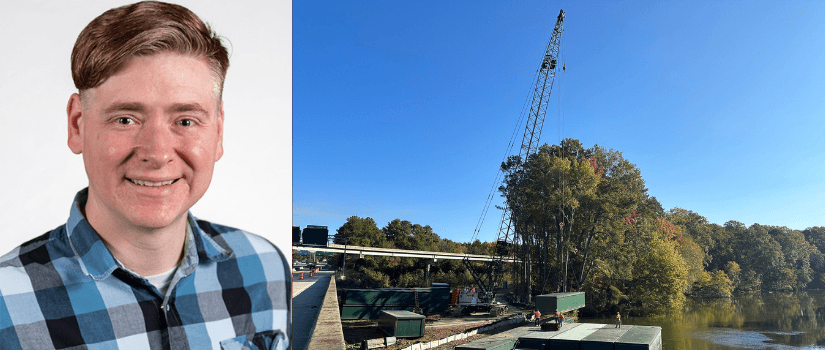As a freshman, Zack Simpson knew he would pursue a career in a STEM field. But geotechnical engineering, a branch of civil engineering that focuses on soil and rock mechanics, was not his anticipated path.
Simpson recalled teasing a fellow student for “playing with dirt” but later found his own geotechnical coursework creatively fulfilling. Today, he channels that creativity in his work as a senior geotechnical engineer for GeoEngineers, Inc. in Charleston.
Simpson graduated from the Molinaroli College of Engineering and Computing with a degree in civil and environmental engineering in 2011 and earned his master’s degree from Virginia Tech in 2013. He accepted a position with GeoEngineers in Seattle after graduate school, but when the firm was awarded a project opportunity in South Carolina in 2017, Simpson led the opening of its Charleston office.
GeoEngineers is an engineering and earth sciences consulting firm with expertise in various geotechnical and environmental services, with Simpson’s focus being in the areas of soft ground remediation and seismic hazard assessment. The firm works on a variety of projects ranging from small to large infrastructure and developments to multi-million-dollar transportation design-builds.
“I really enjoy this type of work because no two projects are the same,” Simpson says. “Unlike some other engineering fields where you can plug numbers into a spreadsheet and crank out an answer, geotechnical engineering is more of an experienced-based field that rewards creativity. Projects are less cut and dry, and the engineering can seem closer to an art than a science.”
Simpson is involved in several South Carolina-based construction projects, including Carolina Crossroads, the largest transportation project in state history. He has developed geotechnical recommendations for bridge design during phases one and two of the multi-phase effort to redesign 14 miles of I-20, I-26 and I-126 through the area commonly known as “Malfunction Junction.”
Simpson also worked on the U.S. 21 Harbor River Bridge replacement in Beaufort, which provides access to three barrier islands in the South Carolina Lowcountry region. The GeoEngineers team performed site exploration, soil characterization, geotechnical design, project management, scheduling and construction oversight for the new bridge, which is more than 3,000 feet long and 65 feet high.
Simpson was also involved in efforts to remediate the containment wall of the Hugh K. Leatherman Sr. shipping terminal near Charleston Harbor. When the wall was deformed during construction of the new terminal, Simpson’s team developed a ground improvement strategy to stabilize the wall and keep construction moving forward.
Hamilton Puangnak is an associate geotechnical engineer with GeoEngineers and has worked alongside Simpson for more than a decade.
“Zack specializes in ground improvement for sites with highly compressible soils and those at risk of earthquake-induced liquefaction,” Puangnak says. “His approach to consulting is both thoughtful and pragmatic, and his proactive communication, leadership and mentorship make him an invaluable asset to our team and a respected figure among his peers.”
While Simpson has compiled many accomplishments in the geotechnical engineering field, his career path was unexpected. He entered college with an interest in structures, but after being exposed to various disciplines within civil engineering, he found geotechnical engineering to be a rewarding creative outlet. As a student, he interned in the college’s hydrology lab and was selected to spend one summer working at the University of Auckland in New Zealand. His work in these labs conducting research and testing on dam failures and sediment deposition, in addition to his courses taught by Associate Professor Charles Pierce, significantly influenced his career path.
“Dr. Pierce was a great professor, and the subject matter really clicked with me,” Simpson says.
Simpson advises that current civil engineering students keep an open mind as they explore the various fields of engineering, whether transportation, water, structural or geotechnical. He understands from experience that what they discover they like best might surprise them.
“Don’t get fixated on one specific field too early,” Simpson says. “Allow yourself to experience different aspects of civil engineering and then go with what resonates with you. That will result in a career that is satisfying and fulfilling.”
